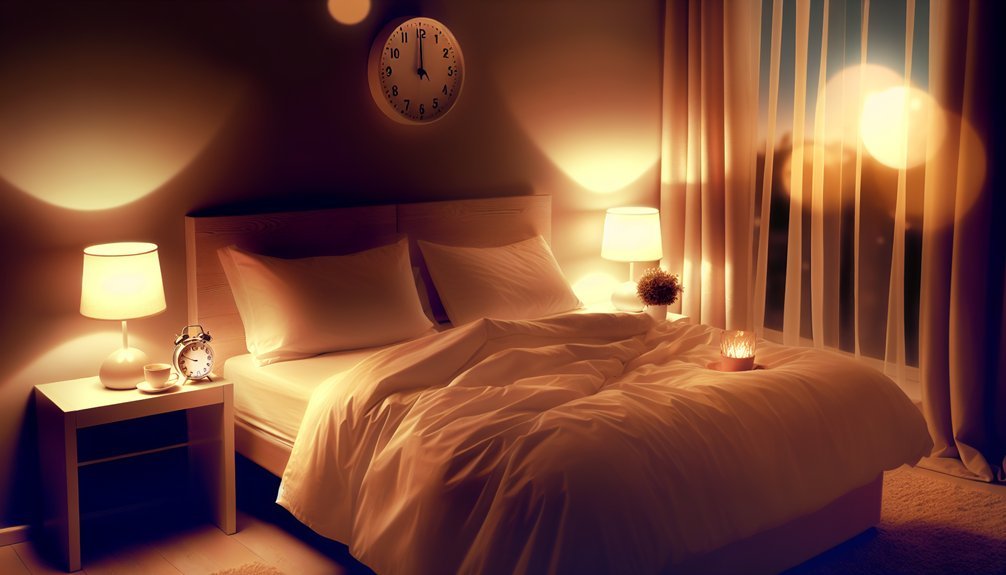To achieve deep relaxation and restful sleep, stick to a consistent sleep schedule and create a calming bedtime routine. Opt for soft lighting, gentle music, and a cool room temperature to set the right environment. Limit screen time before bed to minimize blue light exposure, and incorporate stress-management techniques like mindfulness and journaling. These practices can significantly enhance your sleep quality and overall well-being. Discover even more tips to improve your sleep hygiene.
Key Takeaways
- Maintain a consistent sleep schedule by going to bed and waking up at the same time daily to regulate your circadian rhythm.
- Establish a relaxing bedtime routine that includes dimming lights, gentle stretching, or meditation to signal your body to wind down.
- Optimize your sleep environment with soft lighting, blackout curtains, and a cool room temperature for enhanced comfort and deeper sleep.
- Limit screen time before bed to reduce blue light exposure, which disrupts the natural sleep-wake cycle; consider reading instead.
- Manage stress and anxiety through mindfulness techniques, breathing exercises, or journaling to promote a peaceful state of mind before sleep.
The Importance of a Consistent Sleep Schedule

When you prioritize a consistent sleep schedule, you're setting the foundation for better rest and overall health.
Sleep consistency helps regulate your circadian rhythm, making it easier for you to fall asleep and wake up feeling refreshed. When you go to bed and rise at the same time daily, your body learns to anticipate these patterns, leading to improved sleep quality.
This routine doesn't just boost your energy; it enhances your mood and focus throughout the day. You'll find that embracing this freedom allows you to fully engage in life without the drag of fatigue.
Creating a Relaxing Bedtime Routine

Establishing a relaxing bedtime routine can significantly enhance your sleep quality, as it signals to your body that it's time to wind down.
Embrace bedtime rituals that create a calming ambiance, allowing you to transition smoothly into sleep. Here are a few ideas to consider:
- Dim the lights and play soft music to set a soothing atmosphere.
- Engage in gentle stretching or meditation to release tension.
- Enjoy a cup of herbal tea to promote relaxation.
Optimizing Your Sleep Environment

To achieve restful sleep, it's essential to optimize your sleep environment, as a well-designed space can significantly impact your ability to fall and stay asleep.
Start by adjusting your sleep lighting; soft, warm lights create a calming atmosphere that signals your body it's time to wind down. Consider blackout curtains to block out unwanted light, enhancing darkness for deeper sleep.
Temperature control is equally crucial—aim for a cool room, ideally between 60-67°F (15-19°C). This range promotes comfort and helps regulate your body's core temperature.
Keep your bedding cozy but breathable, allowing you to stay relaxed throughout the night. By fine-tuning these elements, you're setting the stage for a truly refreshing night's sleep.
Limiting Screen Time Before Bed

Limiting screen time before bed can significantly improve your sleep quality.
Instead of scrolling through your phone or watching TV, consider trying alternative relaxation activities like reading or meditating.
These practices can help your mind unwind and prepare for a restful night.
Impact on Sleep Quality
Since screens emit blue light that interferes with your body's natural sleep-wake cycle, reducing screen time before bed can significantly enhance your sleep quality.
By limiting your exposure, you can support your sleep cycles and maintain hormonal balance, allowing your body to prepare for rest more effectively.
Consider these simple steps to improve your nighttime routine:
- Set a specific time to turn off all screens.
- Replace screen time with calming activities, like reading or meditation.
- Create a tech-free zone in your bedroom.
Alternative Relaxation Activities
What can you do to unwind without screens before bed? Embrace the freedom of alternative relaxation activities that help you disconnect and recharge.
Try mindful breathing; take deep, slow breaths to calm your mind and body. Focus on each inhale and exhale, letting go of the day's stress.
Pair this with gentle stretching to release tension from your muscles. A few simple stretches can ease your body, making it easier to relax into sleep.
Create a cozy atmosphere, perhaps with soft lighting or soothing music, to enhance your experience.
Managing Stress and Anxiety

To ensure a restful night's sleep, managing stress and anxiety is crucial. You can reclaim your peace by incorporating simple practices into your routine.
Start with mindfulness techniques to ground yourself in the present moment. Breathing exercises can help calm your mind and regulate your emotions.
Consider these strategies:
- Set aside time for meditation: Create a dedicated space for quiet reflection.
- Practice deep breathing: Inhale deeply for a count of four, hold for four, and exhale for four.
- Journal your thoughts: Write down worries before bed to release them.
The Role of Diet and Exercise in Sleep Quality

What you eat and how you move can greatly affect your sleep quality.
Paying attention to nutrition and timing your workouts can make a big difference in how well you rest at night.
Plus, being mindful of caffeine consumption is crucial for achieving better sleep.
Impact of Nutrition
While many factors influence your sleep quality, nutrition and exercise play crucial roles that shouldn't be overlooked.
To enhance your sleep, focus on nutrient timing and incorporating sleep foods into your diet. Here are some tips to consider:
- Opt for complex carbs like whole grains to help your body produce serotonin.
- Include magnesium-rich foods like spinach and almonds, which promote relaxation.
- Avoid heavy meals and caffeine close to bedtime to prevent disruptions.
Exercise Timing Importance
Nutrition and exercise are intertwined when it comes to improving sleep quality. The timing of your workouts plays a crucial role. Aim to finish your exercise session at least three hours before bedtime. This allows your body to unwind, making it easier to drift into a restful sleep.
Here's a quick guide on exercise types and their ideal workout duration:
| Exercise Type | Ideal Duration | Best Time to Exercise |
|---|---|---|
| Aerobic (running) | 30-60 minutes | Morning or early evening |
| Strength training | 30-45 minutes | Afternoon or early evening |
| Yoga | 20-60 minutes | Anytime (relaxing) |
| Stretching | 10-15 minutes | Before bed (calming) |
Choosing the right exercise type and timing can significantly enhance your sleep quality.
Caffeine and Sleep
Caffeine can significantly impact your sleep quality, especially if consumed too close to bedtime. Your body needs time to process caffeine, and if you don't allow for proper caffeine metabolism, you might find yourself tossing and turning at night.
To improve your sleep hygiene, consider these tips:
- Limit caffeine sources like coffee, tea, and energy drinks in the afternoon.
- Be aware of hidden caffeine in chocolate and certain medications.
- Experiment with switching to decaffeinated options later in the day.
Natural Sleep Aids and Their Benefits

If you're struggling with sleep, exploring natural sleep aids can be a game-changer. Herbal supplements like valerian root and chamomile offer calming effects, helping you drift off more easily.
These time-tested remedies can promote relaxation without the groggy side effects of pharmaceuticals.
Incorporating sleep aromatherapy into your bedtime routine can elevate your experience even further. Essential oils like lavender and bergamot create a soothing atmosphere, signaling to your body that it's time to unwind.
Just a few drops on your pillow or in a diffuser can work wonders.
Conclusion
By prioritizing these sleep hygiene practices, you're not just setting the stage for better rest—you're unlocking the secret to a more energized, focused you. Imagine drifting off easily, waking refreshed, and tackling each day with newfound vigor. But what if one small change could transform your nights forever? As you embrace consistency, relaxation, and mindful choices, you'll discover that the best sleep isn't just a dream; it's within your reach. Are you ready to take that step?




